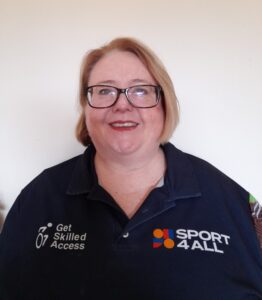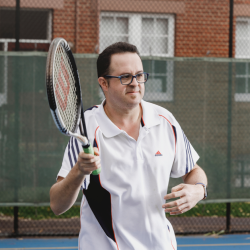Learning Through Laughter: Inclusive Sport Education in Action

Fiona Kleinitz
Inclusion Coach - Sport North East
A Different Kind of Conversation
I was invited to take part in an event called I’m So Glad to See You, hosted in partnership with Sport North East, La Trobe University Albury-Wodonga, and the Ovens & Murray Health Promotion Unit.
It wasn’t a typical panel discussion. Instead, it borrowed its format from the television show Thank God You’re Here. Actors performed exaggerated scenes that highlighted what can go wrong when people enter complex situations involving distress or misunderstanding.
It was funny, uncomfortable at times, and, most importantly, effective. The humour disarmed the audience, created a safe space for reflection, and opened the door to learning in a way that felt engaging rather than confrontational.
Sport on Stage: Miscommunication and Disability
I was part of the panel responding to the sports scene. The actors played out a situation where coaches were running a drill with children, including those with disability and neurodiverse kids, and everything that could go wrong… did. Instructions were rushed, players were confused, and frustration built quickly.
As Inclusion Coaches, we see versions of this in real life. Miscommunication doesn’t always come from a lack of care, but often from a lack of preparation or awareness. Coaches may not realise when instructions are inaccessible. Volunteers may not know how to adapt a game so that everyone can take part.
What I shared with the audience is this: small, simple adjustments can make all the difference. Checking in to see if everyone has understood. Breaking down instructions into smaller steps. Allowing kids the space to try again without pressure. It doesn’t require big budgets or major overhauls, just a mindset that inclusion is possible and valuable.
For me, sport is often the first entry point into community life. When it is inclusive, it creates belonging. When it isn’t, it can reinforce exclusion. That’s why events like this matter – they show us the cost of getting it wrong, but also the opportunity we have to get it right. This is the essence of inclusive sport education: equipping coaches and clubs with the awareness and tools to make participation open to everyone.
Lessons from Health: What Happens in Hospitals
The first scene of the event placed us in a hospital. A patient arrived in an emergency situation, but the staff didn’t take the time to understand cultural or communication needs. The scene was funny in the moment, but for many in the audience, it hit a nerve.
For people with disability, hospitals can be some of the most challenging environments. Rushed staff, medical jargon, and assumptions about what someone can or can’t do often get in the way of real care. The result can be fear, frustration, or a lack of trust.
From where I stand, this connects directly to sport. If someone has a negative experience in a healthcare setting, it doesn’t just impact their treatment – it can influence how confident they feel joining community activities later on. Health and sport aren’t separate silos. Both are spaces where people deserve to feel safe, respected, and included. That’s why inclusive sport education also means recognising how broader systems like health and wellbeing impact participation.
Lessons from Schools
The second scene focused on a student experiencing crisis at school. In this case, the young person was unhoused, overwhelmed, and unsupported. Teachers tried to help, but the missteps piled up, showing how easily intentions can fall flat without the right tools.
For me, this reinforced how important schools are in shaping young people’s understanding of inclusion. If students learn early that differences are normal and valuable, they will carry that awareness throughout their lives.
Inclusive sport education starts here too. Sport4All works with schools for this very reason – helping teachers and students understand what disability inclusion looks like, not just in theory but in everyday practice. The schoolyard and the sports field are both places where young people learn about fairness, teamwork, and belonging. We need to make sure those lessons are positive.





Why Humour Worked
What stood out most about the event was the format itself. We weren’t sitting through lectures or being told what we were doing wrong. Instead, we laughed. We cringed a little. And because of that, we listened.
Humour has a way of lowering defences. People who might normally shut down when hearing about sensitive topics learnt instead. The exaggerated scenes showed the issues clearly, but without blame. The panel then helped turn those moments into learning.
As I looked around the room, I could see people nodding, taking notes, and genuinely reflecting. That’s the power of creative approaches – they don’t just deliver information, they change the way people feel about it.
Watch the Full Event
The entire I’m So Glad to See You session was recorded and is available online. The event runs for just over an hour, but if you’d like to skip directly to specific scenes, here are the time stamps:
- Scene 1: Hospital – Emergency Without Understanding (5:00 – 25:00)
- Scene 2: High School – Youth in Crisis (25:00 – 50:00)
- Scene 3: Sports Scene – Miscommunication and Disability (50:00 – end)
Each scene was followed by a panel reflection, unpacking what went wrong, how those barriers play out in real life, and the practical steps communities can take to create more inclusive environments.
Building Bridges Through Sport
Being part of this event reminded me that inclusion doesn’t happen in isolation. Health services, schools, and sport all play a role. Each can either create barriers or build bridges.
As an Inclusion Coach with Sport4All, my focus is on sport – but the lessons from this event stretched far wider. It showed me how important it is for communities to connect the dots, so that people feel supported not just in one setting, but in all aspects of their lives.
When sport is inclusive, it becomes a place of healing, confidence, and joy. When schools embrace inclusion, they prepare young people for a more empathetic future. And when health services listen and adapt, they create trust that carries into the community.
That’s what I’ll take forward from this experience – a reminder that inclusion is everyone’s responsibility, and that together we can build communities where people don’t just participate, they belong. And at the centre of it all is inclusive sport education – giving people the knowledge and confidence to create change.
Get the Sport4All news sent to your inbox. Subscribe to our monthly newsletter!
"*" indicates required fields

